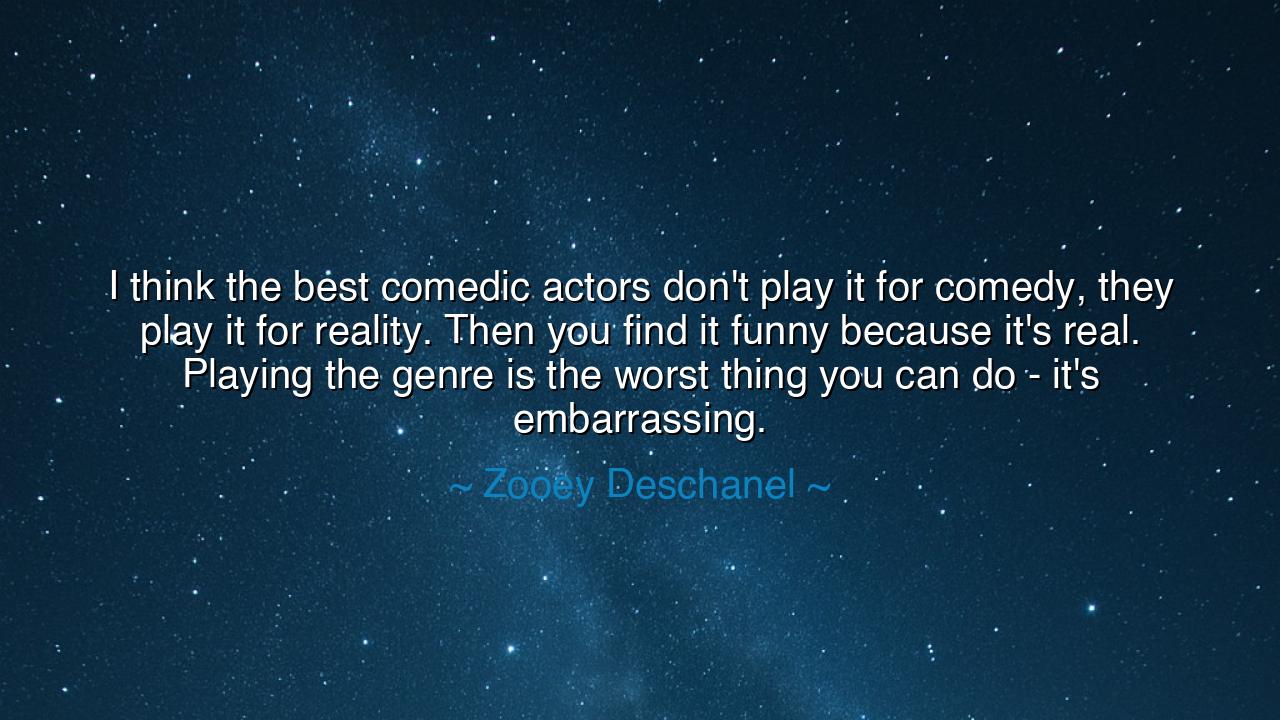
I think the best comedic actors don't play it for comedy, they
I think the best comedic actors don't play it for comedy, they play it for reality. Then you find it funny because it's real. Playing the genre is the worst thing you can do - it's embarrassing.






In the words of Zooey Deschanel, we are reminded that truth is the soul of comedy, and that to pretend at laughter is to destroy it. “The best comedic actors don’t play it for comedy, they play it for reality,” she says — and in this she speaks the oldest of artistic truths: that only when one is sincere does the world become moved, whether to laughter or to tears. To play the genre — to force the mask, to seek laughter as an end rather than a revelation — is, as she warns, embarrassing, for it betrays the sacred trust between performer and audience. The actor must not chase the echo of joy, but embody the human truth from which joy naturally springs.
The ancients understood this paradox well. The tragedians and the jesters of old knew that comedy and tragedy are siblings born of the same mother — truth. In the marketplace of Athens, the philosopher Aristophanes crafted plays that mocked the powerful, yet he did not write them merely to make men laugh. He held up a mirror to society, showing the foolishness and vanity that dwell in every human heart. The laughter of the audience was not hollow; it was recognition — laughter with salt in it, laughter that taught. So too does Deschanel remind us that the real is always funnier, deeper, and more lasting than the performed.
To play for reality, then, is to surrender to authenticity. It is to allow one’s own awkwardness, fear, and wonder to stand unpolished before the world. When an actor speaks a line not with the intent to amuse but with the courage to be true, something miraculous occurs — the audience laughs, not because the actor sought their approval, but because they saw themselves reflected upon the stage. In that instant, laughter becomes revelation. It is no longer the laughter of mockery, but the laughter of recognition — the laughter of souls meeting across the chasm of performance.
Consider the example of Charlie Chaplin, whose art transcended words and ages. Chaplin never sought to "play comedy." He played the truth of human struggle — hunger, love, pride, humiliation — and through that truth came laughter that shook the world. His character, the Tramp, stumbled through life with grace and sorrow intertwined. People laughed not because he was ridiculous, but because he was real. He made visible the quiet suffering that all humans carry, and through his sincerity, he transformed pain into light. Thus, he lived the very lesson Deschanel speaks: that comedy without truth is noise, but truth with humility becomes divine.
There is heroism in honesty, especially in a world enamored with performance. The temptation to "play the genre" — to exaggerate, to seek applause — is the temptation of the false self. But the artist, like the sage, must resist this illusion. The true craft lies not in masks, but in vulnerability. To act well, one must feel deeply; to make others laugh, one must first understand sorrow. The ancients would say: “He who wears the mask too long forgets his own face.” Deschanel’s warning is not just for actors, but for all who perform — for in life, too, many live as if on stage, shaping their words for approval rather than truth.
What then shall we learn? That whether one stands before a camera or before the eyes of the world, the path of integrity is the same. Do not seek to impress; seek to express. Do not strive to appear clever or kind or funny — strive instead to be real. For when you speak or act from that deep, quiet center of truth within you, life itself becomes art, and your presence becomes a mirror in which others see themselves and laugh — not at you, but with you.
So let this be the teaching you carry: in your words, in your craft, in your living — play it for reality. Do not perform life as a genre, for to live as a genre is to live falsely. Be sincere even when sincerity feels awkward. Be vulnerable even when laughter may follow. For the laughter that comes from truth is holy, while the laughter that comes from pretense is hollow. When you honor what is real, the world will respond — not with mere applause, but with recognition, gratitude, and the quiet joy that says: This, this is what it means to be human.






AAdministratorAdministrator
Welcome, honored guests. Please leave a comment, we will respond soon